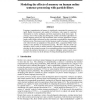Free Online Productivity Tools
i2Speak
i2Symbol
i2OCR
iTex2Img
iWeb2Print
iWeb2Shot
i2Type
iPdf2Split
iPdf2Merge
i2Bopomofo
i2Arabic
i2Style
i2Image
i2PDF
iLatex2Rtf
Sci2ools
132
click to vote
NIPS
2008
2008
Modeling the effects of memory on human online sentence processing with particle filters
Language comprehension in humans is significantly constrained by memory, yet rapid, highly incremental, and capable of utilizing a wide range of contextual information to resolve ambiguity and form expectations about future input. In contrast, most of the leading psycholinguistic models and fielded algorithms for natural language parsing are non-incremental, have run time superlinear in input length, and/or enforce structural locality constraints on probabilistic dependencies between events. We present a new limited-memory model of sentence comprehension which involves an adaptation of the particle filter, a sequential Monte Carlo method, to the problem of incremental parsing. We show that this model can reproduce classic results in online sentence comprehension, and that it naturally provides the first rational account of an outstanding problem in psycholinguistics, in which the preferred alternative in a syntactic ambiguity seems to grow more attractive over time even in the absence...
Information Technology | NIPS 2008 | Online Sentence Comprehension | Sentence Comprehension | Sequential Monte Carlo Method |
Related Content
| Added | 30 Oct 2010 |
| Updated | 30 Oct 2010 |
| Type | Conference |
| Year | 2008 |
| Where | NIPS |
| Authors | Roger P. Levy, Florencia Reali, Thomas L. Griffiths |
Comments (0)

